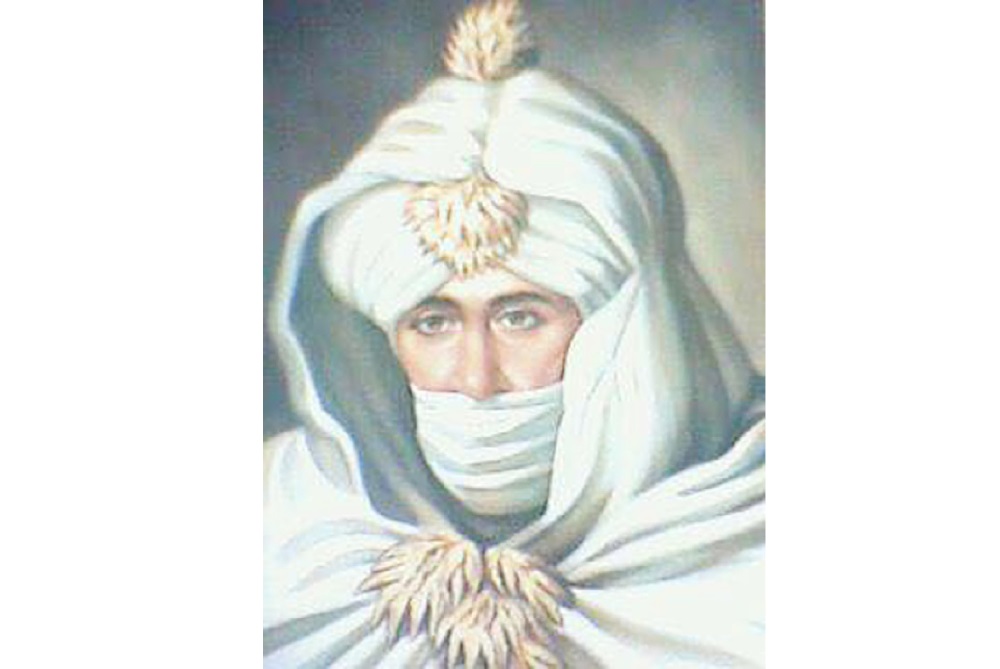In conclusion of our Islamic heritage series, we feature today the founder of another Nigerian Muslim dynasty, Shehu Muhammad Al-Amin El-Kanemi of Borno. This scholar, teacher and political leader was a contemporary of Shehu Usman Dan Fodio (who was featured here last week) and had interacted with him at different levels, as this brief history shows.
With this, we complete our heritage series for this year. We pray that our fasting and devotions during this Ramadhan have found acceptance with Almighty Allah.
We also pray that we live to see another blessed season of Ramadhan, in sha Allah.
Eid Mubarak.
Shehu al-Hajj Muhammad al-Amîn ibn Muhammad al-Kânem was an Islamic scholar, teacher, religious and political leader who advised and eventually supplanted the Sayfawa dynasty of the Kanem-Bornu Empire. In 1846, Al-Kanemi’s son Umar I ibn Muhammad al-Amin became the sole ruler of Borno, an event which marked the end of the Sayfawa dynasty’s eight hundred year rule. The current Shehu of Bornu, is descended from Shehu Al-Kanemi.
He was born in 1776 in Murzuq town in present day Libya. He died on June 8th 1837 in Borno.
Rise to power
Born to a Kanembu father and an Arab mother near Murzuk in what is today Libya, Al-Kanemi rose to prominence as a member of a rural religious community in the western provinces of what was then a much atrophied Borno Empire. The Fulani jihadists, under Usman dan Fodio’s banner tried to conquer Borno in 1808. They partly succeeded. They burnt the capital, Ngazargamu and defeated the main army of the Mai of Borno. The latter called Al-Kanemi for help to repel his Fulani opponents.
By planning, inspiration, and prayer, he attracted a following, especially from Shuwa Arab networks and Kanembu communities extending far outside Borno’s borders. The Mai (monarch), Dunama IX Lefiami rewarded the leader with control over a Bornu province on the Western march. Taking only the title “Shehu” (“Sheikh”), and eschewing the traditional offices, al-Kanemi gathered a powerful following, becoming both the voice of Bornu in negotiations with Sokoto, as well as a semi independent ruler of a trade-rich area with a powerful military. Dunama was deposed by his uncle in 1809, but the support of al-Kanemi brought him back to power in 1813.
Defense against Sokoto
Al Kanemi waged his war against Sokoto not only with weapons but also with letters as he desired to thwart dan Fodio’s jihad with the same ideological weapons. He carried on a series of theological, legal and political debates through letters with the Sultan of Sokoto Usman dan Fodio, and later with his son, Muhammed Bello. As the expansion of Sokoto was predicated upon a struggle against paganism, apostasy, and misrule, Al-Kanemi challenged the right of his neighbours to strike at a state which had been Muslim for at least 800 years.These debates, often on the nature of Jihad and Muslim rule, remain points of contention in modern Nigeria.
Rule over Borno
When El-Kanemi rose to power after the Fulani jihad, he did not totally reorganise the Sayfawa kingdom: he only tried to insert his men in the existing framework of the Sayfawa territorial fiefs, the chima chidibe. The historian Cohen argued that the main political organisation of nineteenth century Borno was based on personal relationship and that Al-Kanemi initiated a more formal patron-client relationship.
Six men support al-Kanemi’s rise to power in Bornu. They included his childhood friend Al-Hajj Sudani, a Toubou trader and family friend al-Hajj Malia, his eldest brother-in-law from his wife’s family who led the Kanembu Kuburi in Kanem as Shettima Kuburi, and three Shuwa Arabs: Mallam Muhammad Tirab of Baghirimi, Mallam Ibrahim Wadaima of Wadai, and Mallam Ahmed Gonomi.
However, as last mentioned, we still ignore to what extent Al-Kanemi was dominating the whole territory of Borno after the Fulani jihad. Was he only at the head of a personal principality as Last suggested, or did he totally overthrow the power of the Mai? This process which may have been longer than Historian Brenner suggested is not very well documented. Oral history and European explorers’ narratives only retain Al-Kanemi’s irresistible rise to power. In this version of early nineteenth century history, Al-Kanemi assumed power in the 1810s without any competition from Mai Dunama IX Lefiami before 1820. El-Kanemi, was not just the face of Borno to foreign leaders, he became more and more indispensable to the mai. Some in mai Dunama’s coterie were believed to have been behind an attempt to kill the Shehu in 1820. At this date, mai Dunama and king Burgomanda of Baguirmi plotted to get rid of El-Kanemi. This foreign intervention in Bornu politics was a failure and mai Dunama was replaced by mai Ibrahim. El-Kanemi, while still titular subject of the new mai, had his own seals struck as Shehu of all Bornu.
In 1814, al-Kanemi constructed the new city of Kukawa. This new city became the de facto capital of Borno, as al-Kanemi took the title Shehu.
About 1819-20, Mai Dunama rose up in revolt against al-Kanemi, and was subsequently killed in battle. Al-Kanemi then made Dunama’s brother, Ibrahim, Mai. Then in the 1820s, al-Kanemi drove the Fulani out of Bornu, challenging the Sokoto Caliphate, and occupying the Deya-Damaturu area. This was followed by the occupation of the Kotoko kingdom city states of Kusseri, Ngulfai, and Logone, after defeating the Bagirmi in 1824.
Sayfawa mais remained titular monarchs after El-Kameni’s death in 1837.
In 1846 the last mai, in league with the Ouaddai Empire, precipitated a civil war, resisted by El-Kanemi’s son, Umar (1837–1881). It was at that point that Umar became sole ruler, thus ending one of the longest dynastic reigns in African history.
Al-Kanemi as seen by Major Dixon Denham
In February 1823, a British expedition led by Major Dixon Denham and Captain Hugh Clapperton arrived in Borno. They were introduced to Al-Kanemi. In his travel narrative published in 1826, Dixon Denham described Al-Kanemi:
“Nature has bestowed on him all the qualifications for a great commander; an enterprising genius, sound judgment, features engaging, with a demeanour gentle and conciliating: and so little of vanity was there mixed with his ambition, that he refused the offer of being made sultan.”
— Dixon Denham
Wikipedia

 Join Daily Trust WhatsApp Community For Quick Access To News and Happenings Around You.
Join Daily Trust WhatsApp Community For Quick Access To News and Happenings Around You.


